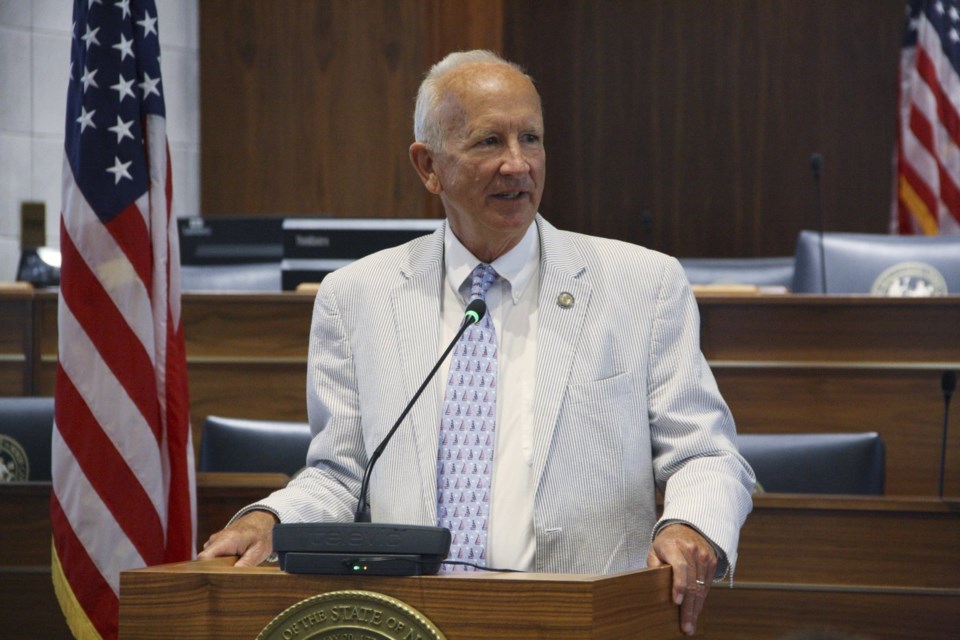RALEIGH, N.C. (AP) — North Carolina's highest court upheld on Friday a law that gave adult victims of child sexual abuse two additional years to seek civil damages, rejecting arguments that the temporary window violated constitutional protections for those facing claims that otherwise could no longer be pursued in court.
In a case involving a local school board sued by three former students years after an ex-high school coach was convicted of crimes against team members, the state Supreme Court ruled the General Assembly was able to enact a key provision within the 2019 SAFE Child Act that was also signed by then-Gov. Roy Cooper.
Before the law, victims of sexual abuse before age 18 effectively had until turning 21 to file such civil claims against perpetrators. Now such victims have until they’re age 28. But the issue before the court in the Gaston County case was the provision that gave other child sex abuse victims whose time period to sue ended the ability to file valid lawsuits for damages from January 2020 through December 2021.
Supporters of the provision said it allowed victims to ensure their abusers and institutions that allowed abuse to happen pay for the damage, and that abusers are called out publicly. At least 250 child sex abuse lawsuits were filed in North Carolina under that one-time lookback period, according to a board legal brief.
A divided state Court of Appeals panel in 2023 had already upheld the two-year window as constitutional.
The board's attorney had argued the lookback period violated the North Carolina Constitution by stripping away fundamental rights protected from retroactive alterations by the legislature. He also said that upholding the litigation window would make it impossible in some cases to mount vigorous defenses given the passage of time and destroyed records.
Writing Friday's majority opinion, Chief Justice Paul Newby said a review of previous versions of the state constitution showed that a current provision barring “retrospective laws” expressly applies only to retroactive criminal and certain tax laws. And another constitutional provision that can be used to strike down laws that violate a person's “vested right” does not apply here, he added.
“Our precedents confirm that the General Assembly may retroactively amend the statute of limitations for tort claims,” Newby wrote, referring to civil actions in which someone seeks monetary compensation for harm by another.
The coach, Gary Scott Goins, was convicted of 17 sex-related crimes in 2014 and sentenced to at least 34 years in prison. The former student-athletes sued the Gaston County Board of Education and Goins in 2020, alleging he sexually assaulted them on multiple occasions. Goins was later dismissed as a defendant in the current lawsuit, according to court documents.
Lawyers for the state help defend the 2019 law in court. Attorney General Jeff Jackson and his predecessor — now Gov. Josh Stein — praised Friday's ruling in a news release.
Since 2002, 30 states and the District of Columbia revived previously expired child sex abuse claims with limited or permanent expansions of claim periods, according to CHILD USA, a think tank advocating for children.
Associate Justice Allison Riggs recused herself from Friday's case, as she wrote the 2023 Court of Appeals opinion while she served on the intermediate-level appeals court. That ruling was largely upheld Friday.
Associate Justice Anita Earls wrote her own opinion Friday that while supporting the outcome criticized harshly the majority for backing Newby's methodology of evaluating whether a law is constitutional. Earls and Riggs are the two registered Democrats on the seven-member court.
Still, Earls wrote, “all justices would hold that the political branches may enact remedial legislation that empowers survivors of child sexual abuse to recover for the harm they endured at the hands of their abusers and those that enabled the abuse, through civil litigation of claims that would have otherwise been barred by the statute of limitations."
The matter was one of five cases involving the SAFE Child Act in which oral arguments were heard by the Supreme Court on one day in September.
Three more of these cases were settled Friday. In one, the court agreed that the law's language permitted lawsuits during the two-year window to be filed against both the perpetrator or the abuse as well as institutions linked to the offender.
That case involved a Catholic layperson accused of sexual abuse in the 1980s. A trial judge had previously ruled that the law's language only permitted litigation against the alleged abuser, and thus dismissed two Catholic entities as defendants. The Supreme Court agreed with the Court of Appeals reversing that decision. Riggs also did not participate in Supreme Court deliberations in this case.
Gary D. Robertson, The Associated Press



